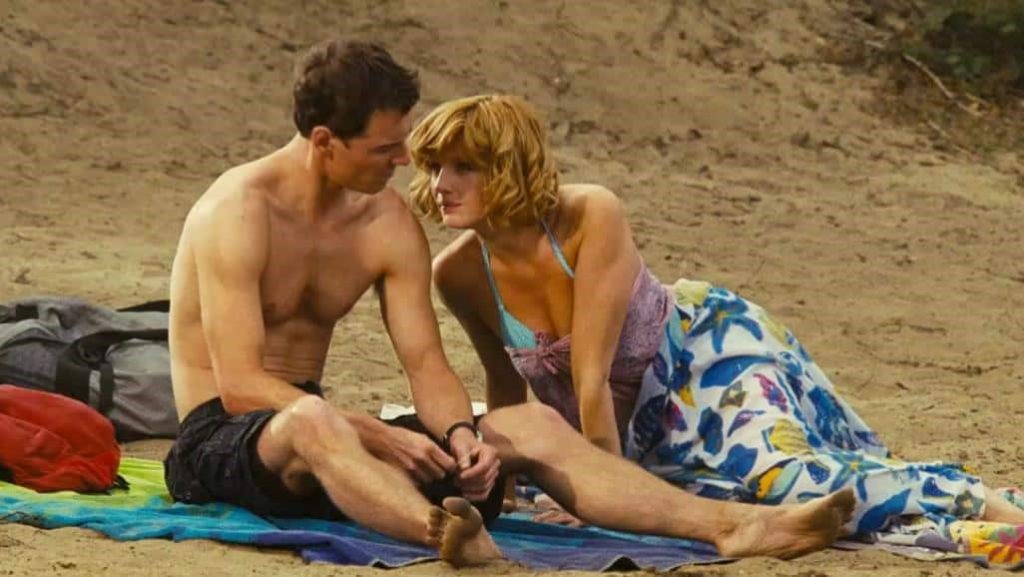Eden Lake
2008

Rated: R
Genre: Horror, Thriller
Country: U.K.
Run-Time: 1h 31min
Director: James Watkins
Cast
Kelly Reily…………………………Jenny
Michael Fassbender…….Steve
Jack O’Connell………………..Brett
I once met a man who argued that Eden Lake was one of the most profoundly disturbing films ever made. As evidence, he told me about two separate occasions he had witnessed women break down into tears while watching the film.
At the time, I hadn’t seen Eden Lake- so yeah, I made a point to watch it the next day.
Eden Lake is a British horror-thriller by James Watkins that actually shares a lot of the same traits as films belonging in the New French Extremity canon- which makes sense since more than a few of Eden Lake’s best ideas seem to be lifted straight from Them [Ils]. The violence in Eden Lake feels very real-world, the movie exploits our fear of the “other” and audiences are forced to witness the gradual physical decline of the film’s protagonists. And like so many films that fall under the New French Extremity label (i.e- Martyrs, Inside, Frontier(s)), if you have an ounce of empathy then buckle up because these films often push emotional boundaries much further than most of their Hollywood counterparts.
That is not to say that Eden Lake should simply be dismissed as a Them [Ils] rip-off. In terms of style, tone and story Eden Lake is a very different creature. Unlike its predecessor, Eden Lake is not interested in setting up a big reveal about the assailants. Here, they make themselves known early and often. Its horrors are also less reliant on atmosphere and jump scares than Them [Ils]. Instead, Watkins’ film relies on hyper-realism and an inescapable sense of nihilistic dread. Eden Lake is the type of film that was made after the turn of the century, during the decade torture was in vogue. And though its few scenes of torture are less graphic than most films of that era, they have far more lasting emotional resonance.
Eden Lake‘s plot revolves around Jenny (Kelly Reilly), an elementary school teacher excited to go on a weekend adventure with her boyfriend Steve (Michael Fassbender). Little does she know Steve has intentions to propose during the trip.
Steve’s plan is to take Jenny to the remote Eden Lake before it gets cut off by developers who have approval to use the lake as the centerpiece in a gated community. Watkins does an excellent job showing how the forest park around Eden Lake has been transformed into a restricted area gearing up for the early stages of development. Fences and scattered construction equipment line the perimeter of the park while surrounding hiking trails are starting to look overgrown due to the lack of visitors. Clearly, Jenny and Steve should not be there, yet what harm could come camping out there for a couple of nights.
Of course, Steve’s plan for a romantic getaway is thwarted at every turn. First he gets ignored at a country pub. Then they witness a scene where a mother disciplines her child with a slap. The people in the hotel room next to them are far too loud. Still, Steve stays insistent that the lake is worth the hassle.
But when the couple finally do arrive at Eden Lake, a group of unruly teens show up to spoil their fun. Fed up, Steve chooses this moment to take a stand, a decision he will eventually regret. Big time.
Though often overlooked, many who have seen Eden Lake remember it as a masterclass in building tension by placing believable protagonists into a relatable bad situation before quickly letting it devolve into a nightmare.
Eden Lake plays on two common fears that exist within most societies: the fear of the gaggle of unsupervised teens and the fear of the uncultivated lower classes. Of course, it is Watkins ‘ employment of mean-spirited, uneducated working-class stereotypes that have made Eden Lake the target of criticism by many, especially in the United Kingdom. But I forgive Watkins. After all, classist stereotypes are often at the heart of many movies, including Deliverance. And lets be honest, the reputation of English youth is not particularly high. Plus the creation of an “us”-”them” here plays a key role in how Watkins builds that sense of fatalistic nihilism. The community surrounding Eden Lake likes to stick together and outsiders are very much unwelcome.
But that is not to say that Jenny and Steve are entirely faultless victims, which is something I have come to better appreciate after my second viewing. Steve could had handled his early entanglements with the teens much differently. And Jenny’s attempt at retribution falls heaviest on the weakest. I’ve also come to better appreciate the motivations of Brett, the gang leader, and the others within the gang. There really is a sense that things could have gone differently, if just…
…but just won’t happen in the environment Walkin’s created, so we spiral towards Jenny’s breaking point and those inevitable moments of sheer heartbreak, including a brutal and extremely memorable ending.
Eden Lake is Watkins statement on the power of putting emotion and tension at the center of a horror film. It’s not that the film isn’t gory, it’s just that the gore is not what people who see Eden Lake are likely to remember. Instead, it’s that sickening feeling you get while watching- and that comes from the increasing, yet very human, awfulness in each scenario.
More people need to make films like Eden Lake. Few horror films know how to push an audiences’ buttons so well. It really is one of the best, most profoundly disturbing modern horror movies ever made.
